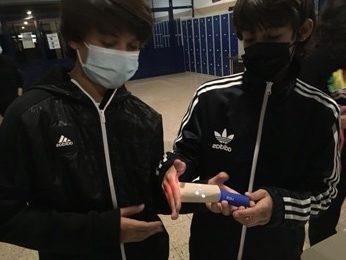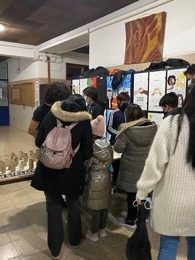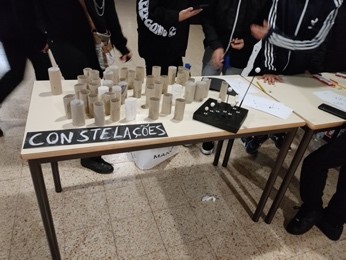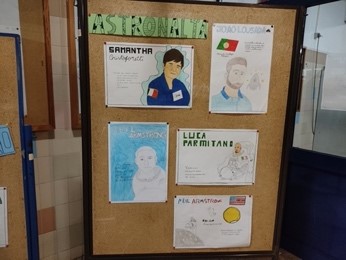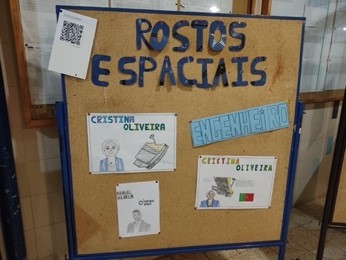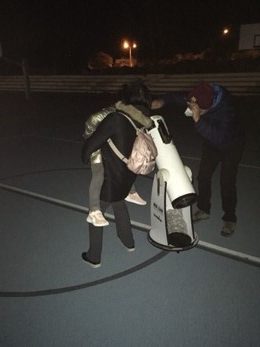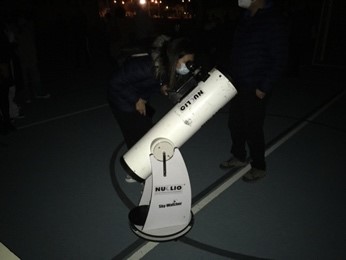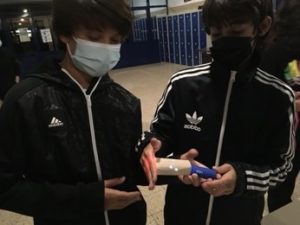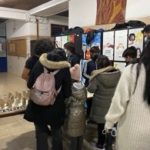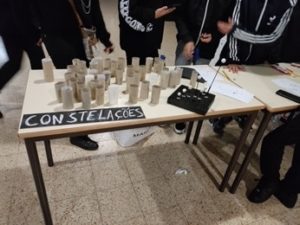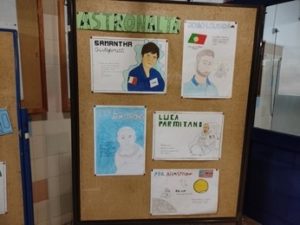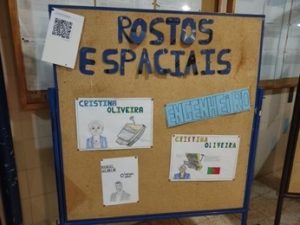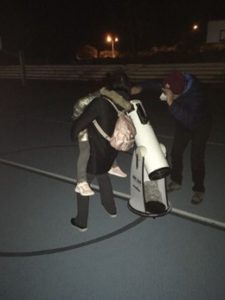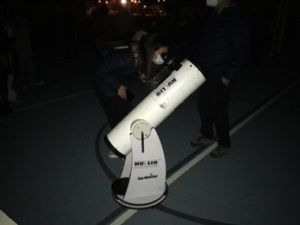Work together with a class of students to plan a fun and educational event for their friends and families.
What would your community like to know about space? Have your students ask their friends and family members about what they would like to learn more about, and from these results help your students organise a community event, where they can share what they have learnt and try and answer these questions.
Have your student’s research activities and experiments that they could present to an audience, and give every pupil an important role in an event for their local community. This allows students to develop their research, communication and team working skills, as well as giving them the opportunity to play an active role in their own learning, and develop a sense of responsibility, as they all take an active role in planning and running this science communication event.
This activity can be organised with an individual class or school group, or in partnership with an external organisation. In this example, this event was organised alongside our partners at NUCLIO, as part of a school intervention in Portugal.
Setting Details
This is primarily a school-based activity but can be adapted to work with any group of young persons, or with external collaborators.
Have your students conduct surveys on what their friends and families would like to learn about. Using the results from this survey, have your students research and plan a series of activities for a community event, where they get to teach an audience and help them learn the answers to their questions.
Ideally, this would be done in person but depending on the chosen activities, this community event could be held online using pre-recorded videos or video conferencing software such as Zoom.
Learning Objectives
- Students take ownership of their own learning and are given responsibilities in the planning and running of an event.
- Develop research and communication skills.
- Develop soft skills such as teamwork and cooperation.
- Reach out to local communities about space-related topics.
- Develop Digital Skills.
Materials needed
- A way of collecting information from the community, this can be done either using an online form (google forms, Kahoot and Mentimeter are good free resources for this) or using simple paper questionnaires.
- Computer or smart devices for students to research the chosen topics.
- Various materials will be needed by the students to present their lessons at the event.
- If you are working with an external contributor, they may need to provide relevant resources and materials.
- A venue space, this could be at your school or another community space.
- You may need audio-visual equipment for any presentation to a large crowd.
- You might also want to provide refreshments.
Script/programme of activity
- Introduce your students to the idea of running a community event, ask them what they would want to see at these sorts of events, and how they would plan it. Do you think others would be interested? How could we learn this? (this could be done as part of a lesson plan)
- Have your students help design the community questionnaire, what questions should be included?
- Have your students conduct surveys in their local communities, collect this information and decide on what topics the students would like to present at their community event.
- Give your students an opportunity to research this topic and find activities, experiments and information they would need to present to an audience. Students could reach out to faculty members that teach other subjects to help create these activities. This can promote lateral thinking and cross-subject collaboration.
- You students may need time to prepare and practice presenting before the event.
- Talk to your students about who is needed to run a successful event, and why these roles are important. Assign each student a role and have them help organise the community event. If they are not presenting an activity, there are many other job roles, such as greeters, evaluators, journalists, and guides.
- When the format of the event is set, and venue space is arranged, invite your community to the event.
- On the day of the event, remind each student of their role and what they should be doing during the event.
- Run the event.
Teacher/educator
The class teacher would be needed to inform their students about the activity and what they hope to achieve by organising this community event. Teachers can also reach out to other teaching staff to help students develop activities, and encourage students to combine what they have learnt with other subject topics.
Depending on the age group of the students involved, the teacher may need to guide the students on how to conduct the survey and analyse the data collected.
Teachers would need to advise students about how to conduct their research and plan their teaching activity, and also advise the students about if their activities are possible with the resources available to the school.
The teacher will need to assign a task to each of the students for planning and running the out-reach event and will need to supervise to ensure that tasks are being done correctly.
Teachers and other supervisors will need to be present at the community event, to help facilitate the activities and ensure that the event runs smoothly.
Guardian
Student’s guardians will need to provide answers to the students’ survey, and then attend the event planned by the students.
Researcher/invited expert
If this event is done in partnership with an external organisation, these invited experts may provide additional activities and expertise that can be presented as part of the community event.
They may also be asked to help the students understand the research and how to conduct the activities they have planned to share at the event.
Stakeholder
You may want to include contributions from external stakeholders who are involved in space research.
Key elements for inclusivenes
It is important to allow students an opportunity to conduct their own research and find methods that interest them and that they would like to present to their friends and families at the community event.
Make sure that all students are given an important role in the planning and running stages of the event, that these responsibilities are something that the pupil is comfortable with, and that these responsibilities are pitched to the students’ capabilities.
Extra information
When this event was conducted in partnership with Our Space Our Future partners NUCLIO in Portugal. Here is some information about their experience:
This community event took place in a school that participated in the Our Space Our Future project, Escola Básica 2,3 Poeta Bernardo Passos, in the Algarve. It was planned from the beginning of our collaboration with the school that at the end of the Our Space school interventions, we would have an event for the community, where we would take the telescopes and have a night with astronomical observations, and the students that participated on the Our Space project would find a way to show the community what they had learned with the project.
The event was in the school, indoors and outdoors, and all the students that participated in the project and their respective families were invited. Also, everyone from the school – teachers, workers, students – were invited because the students made a poster inviting everyone, and the word went around. Students from two nearby schools, that were linked with this school within Our Space project, were also invited with their respective families.
As expected, the students who organised the event came with their families. We were happy to see that staff from the school as well as other teachers (that weren’t working with us in the Our Space project) did come to the event. We had a group of 10 years old from a nearby school that came with their families.
The format of the event was decided by the students from the class of the teacher that worked directly with us. There were several things for visitors to see/do and the students divided the tasks between them.
At the entrance:
- A group of students greeted the visitors and explained the different things that they could do.
Indoors:
- A group of students accompanied visitors at the exposition “Faces from Space” that the students prepared with the Physics teacher, the Arts teacher, and the Portuguese teacher.
- A group of students invited visitors to participate in an activity about the craters on the Moon; they had a recipient with sand, flour, and concrete, simulating the moon soil, and threw small stones to illustrate how craters were formed on the moon.
- A group of students invited visitors to participate in an activity about constellations; they gave visitors toilet paper rolls and a picture of the asterism of a constellation they chose; participants would puncture the paper roll and when finished, the students would show the constellation by putting a flashlight inside the roll; they also explained the different distances of the stars in the same constellation.
Outdoors:
- A group of students approached visitors and helped them recognize the constellation of Ursa Mayor and Cassiopeia, and explained how to find Polaris; afterwards, they told the participants the mythology of those constellations.
- A group of students approached visitors and helped them recognize the constellation of Orion and the star Sirius, in Canis Major; they talked about the types of stars that Betelgeuse and Rigel are, and they told the mythology of those constellations.
- NUCLIO was responsible for the telescope and organised the observations and answered questions.
There was also a group of students that went around, taking photos and interviewing the visitors.
For more information contact geral@nuclio.pt


